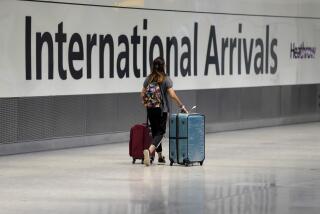Way Eased for 2 Airlines to Sell London Routes : Transportation: Britain’s decision to lift a ban on new airlines at Heathrow Airport could benefit TWA and Pan Am.
- Share via
The British government on Tuesday lifted its longstanding ban on new airlines at London’s Heathrow Airport, easing the sale of London routes owned by two cash-strapped U.S. air carriers.
The decision doesn’t immediately open the door to new competition at one of Europe’s most important airports, because new landing slots aren’t available.
Nor does the decision solve Britain’s long-simmering dispute with the United States over the transfer of London routes that belong to Pan American World Airways and Trans World Airlines. Those routes are governed by treaty.
But observers said the timing of the British announcement suggests that the British are willing to modify the controversial treaty, allowing two other U.S. airlines to take over routes that belong to Pan Am and TWA.
“It is a step in the right direction,” Daniel Kasper, director of the transportation practice for Harbridge House, a Cambridge consulting firm, said. “It lays the legal groundwork for the (United Kingdom) to permit a switch.”
The Heathrow ban was supported by British Airways, the largest airline at London’s close-in airport and the third-largest transatlantic carrier after Pan Am and TWA. Airline executives and analysts said British Air undoubtedly feared stiffer competition from other U.S. air carriers and from Virgin Atlantic, a small but aggressive British carrier.
On Tuesday, British Air issued a statement saying: “We already have competition on virtually every route we fly from Heathrow--we do not fear a little more.”
Ironically, some believe that British Air could be the big winner in treaty negotiations, which resume Thursday, despite new competition at Heathrow.
Jon Ash, managing director of Global Aviation in Washington, said the British are likely to ask for--and win--big concessions from U.S. negotiators who are anxious to transfer Pan Am’s London rights to United Airlines, and TWA’s rights to American Airlines.
Ash said the British are likely to build in restrictions that prevent United and American from expanding their Heathrow operations much. He said many believe that United and American will not be allowed to fly as many daily flights as Pan Am or TWA.
“The British attitude is: We don’t need a deal. You need a deal. So step up to the window and pay the cashier,” said Ash.
Many believe that the United States will grant British Air the valuable right to travel from the U.S. to points in Mexico and Asia. Currently, British Air’s flights from London end in the U.S.
The United States may also permit British Air to strike a marketing deal with a U.S. partner that would allow it to sell tickets to dozens of U.S. destinations that it does not serve.
Ash said British Air is thought to be interested in a partnership with USAir because it has a large domestic network but virtually no overseas markets. A deal would greatly expand British Air’s reach into the United States, because British Air could sell, under its own name, tickets to USAir destinations.
The three-month-long treaty negotiations have taken on a sense of urgency, since both Pan Am and TWA need money from the route sales to stay in business. Pan Am said it needs sale proceeds to make a $75-million payment to Bankers Trust, due Friday.
Although some observers predicted that the treaty dispute would be resolved by Friday--clearing the way for the sale--Pan Am said it would ask Bankers Trust to extend the deadline. The cash-starved airline is in bankruptcy proceedings.
More to Read
Sign up for Essential California
The most important California stories and recommendations in your inbox every morning.
You may occasionally receive promotional content from the Los Angeles Times.













